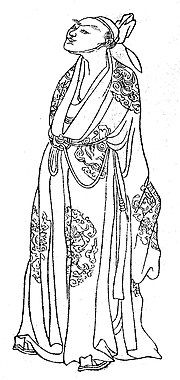Li He
| Li He | |

Li He, as depicted in the 1743 book Wanxiaotang Zhuzhuang Huazhuan (晩笑堂竹荘畫傳)
|
|
| Traditional Chinese | 李賀 |
|---|---|
| Simplified Chinese | 李贺 |
| Hanyu Pinyin | Lǐ Hè |
| Wade–Giles | Li3 Ho4 |
| Courtesy name: Changji | |
| Traditional Chinese | 長吉 |
| Simplified Chinese | 长吉 |
| Hanyu Pinyin | Chángjí |
| Nickname: Shigui | |
| Traditional Chinese | 詩鬼 |
| Simplified Chinese | 诗鬼 |
| Literal meaning | Ghost of Poetry |
| Hanyu Pinyin | Shīguǐ |
| Nickname: Guicai | |
| Chinese | 鬼才 |
| Literal meaning | Spectral Talent |
| Hanyu Pinyin | Guǐcái |
Li He (c. 790–791 – c. 816–817) was a Chinese poet of the mid-Tang dynasty. His courtesy name was Changji, and he is also known as Guicai and Shigui.
He was prevented from taking the imperial examination due to a naming taboo. He died very young, and was noted for his sickly appearance.
He was a dilligent poet, going out on journeys during the day and, when a line of poetry came to him, scribbling it down, and completing the poems when he arrived home in the evening. His poems famously explored ghostly, supernatural and fantastic themes.
His popularity and place in the Chinese literary canon has fluctuated throughout the centuries. His idiosyncratic style of poetry was frequently imitated in the middle ages. His popularity suffered from a change in literary tastes during the Qing era, with his works notably being excluded from the influential Three Hundred Tang Poems, but there was a revival of interest in him in the twentieth century. He was among the Tang poets most admired by Mao Zedong.
Chapter 137 of the Old Book of Tang and chapter 203 of the New Book of Tang each give a brief outline of the biography of Li He.
Li Shangyin, a poet of the following generation, wrote a Short Biography of Li He (simplified Chinese: 李贺小传; traditional Chinese: 李賀小傳; pinyin: lǐ hè xiǎo chuán).
He was born in 790 or 791. It seems likely that he was born in the year of the Horse, as some twenty-three of his surviving poems use the horse as a symbol for the poet.
...
Wikipedia
